人教版高中英语必修四 Unit 1 Women of achievement Words课件(共46张PPT)
文档属性
| 名称 | 人教版高中英语必修四 Unit 1 Women of achievement Words课件(共46张PPT) | 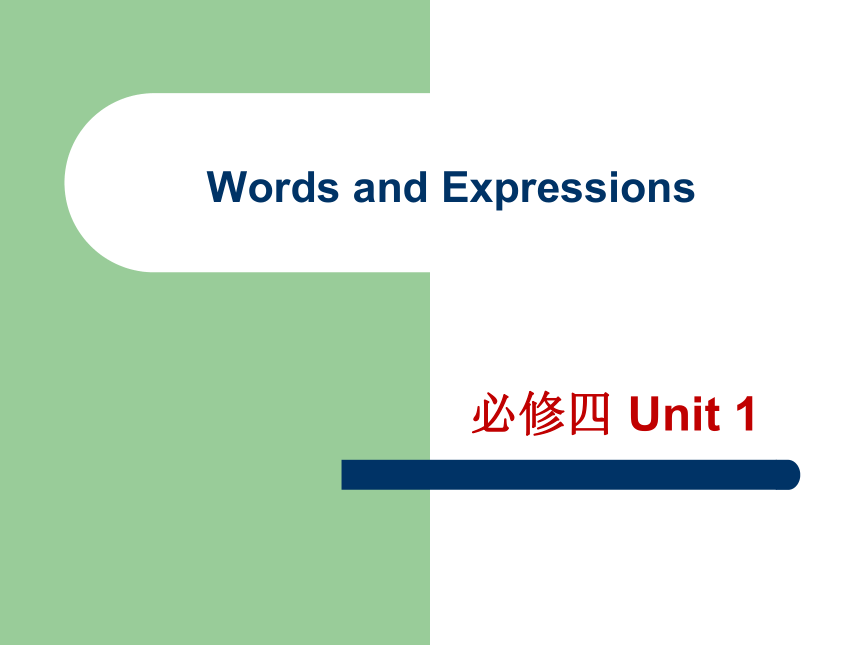 | |
| 格式 | ppt | ||
| 文件大小 | 623.0KB | ||
| 资源类型 | 教案 | ||
| 版本资源 | 人教版(新课程标准) | ||
| 科目 | 英语 | ||
| 更新时间 | 2020-09-27 22:43:19 | ||
图片预览

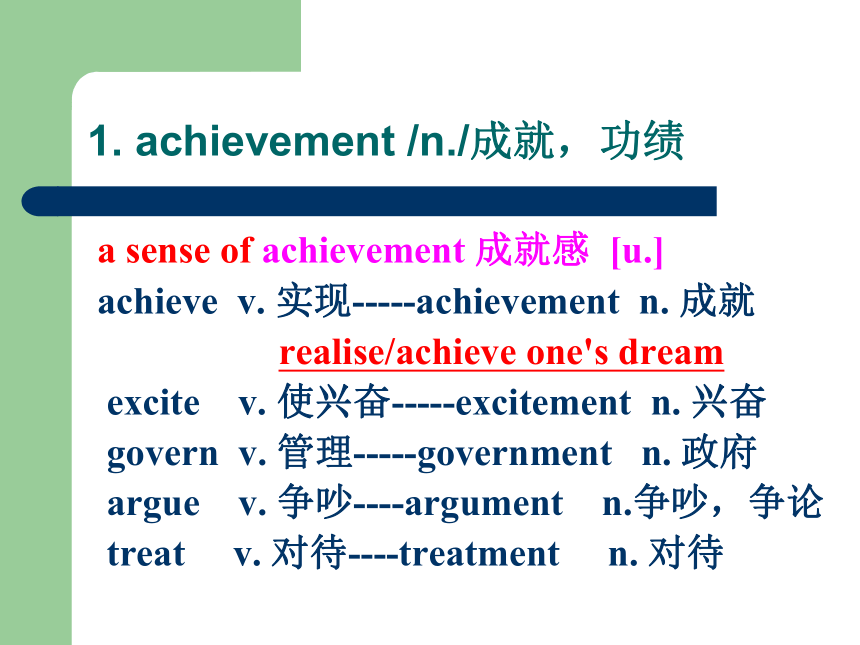
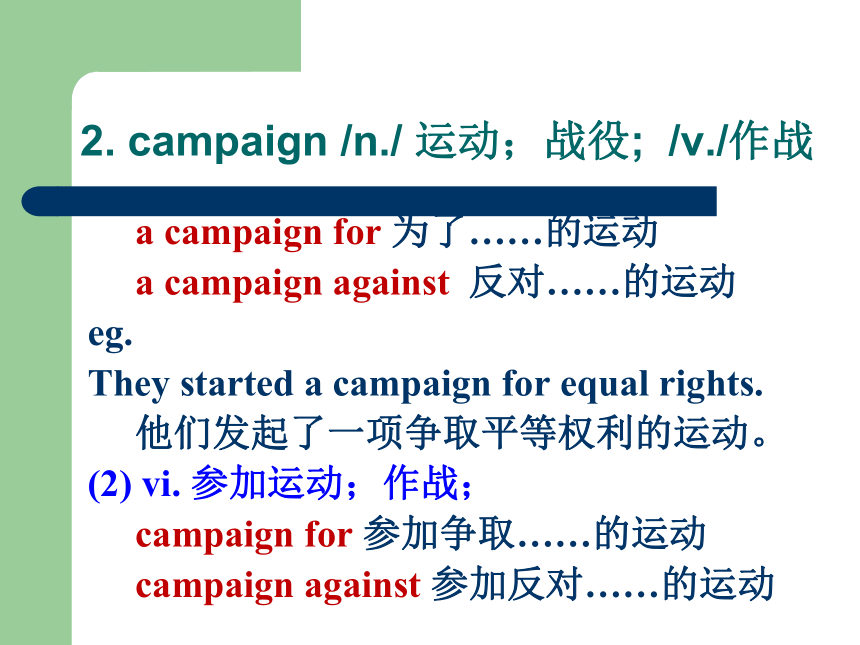

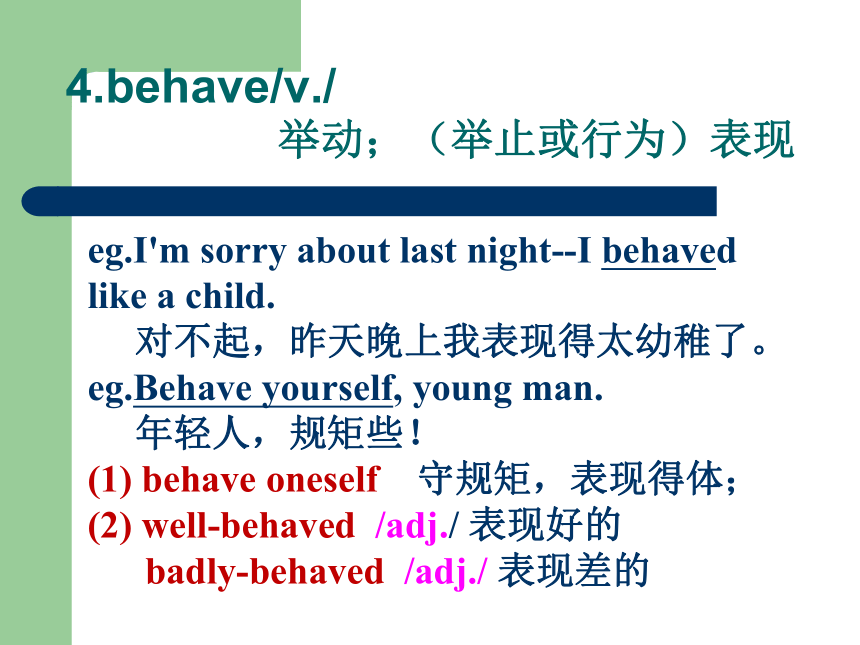
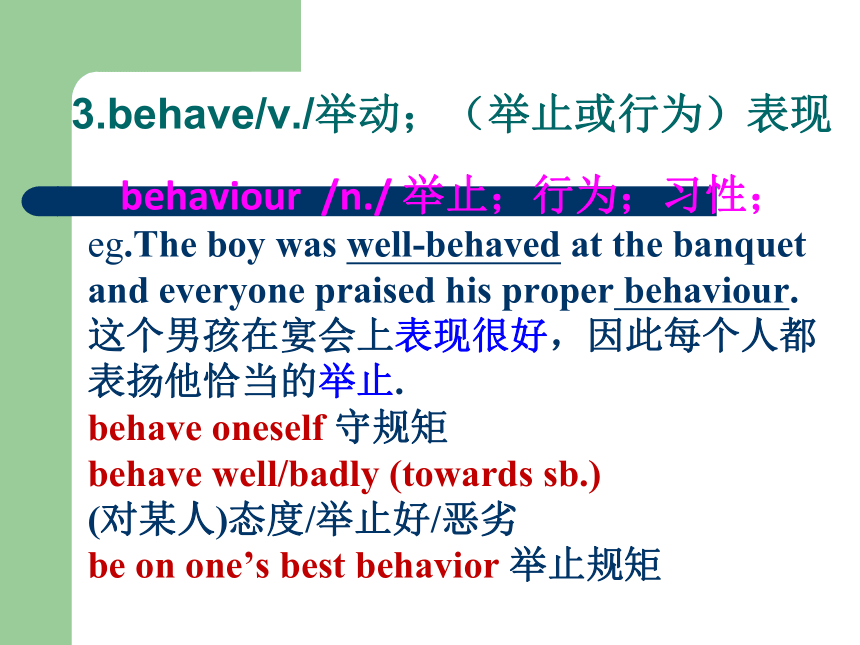

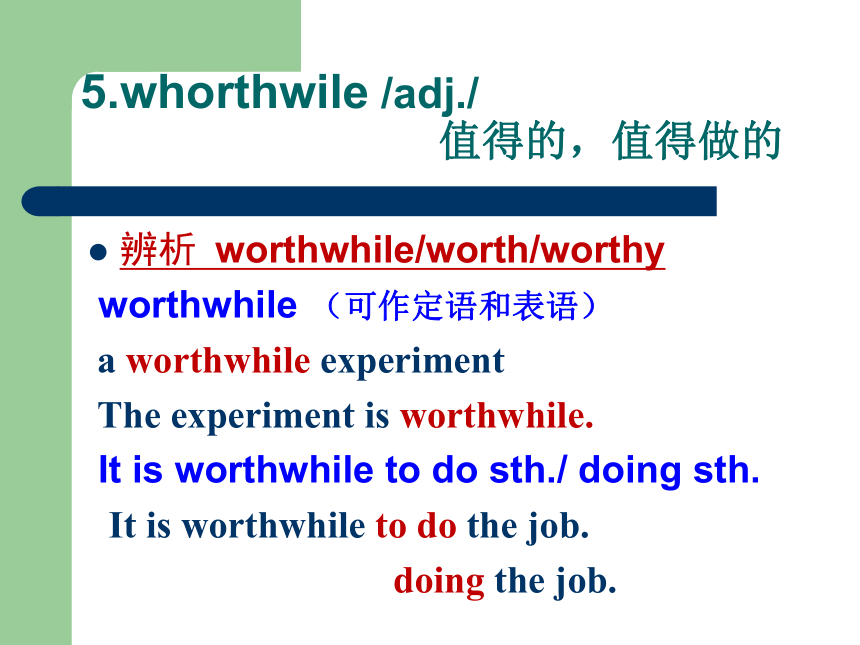

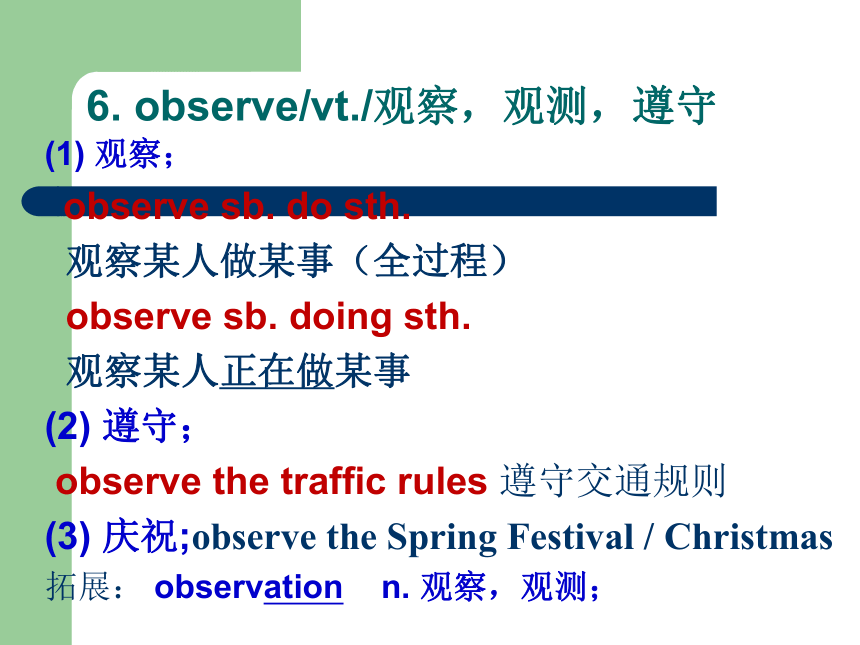
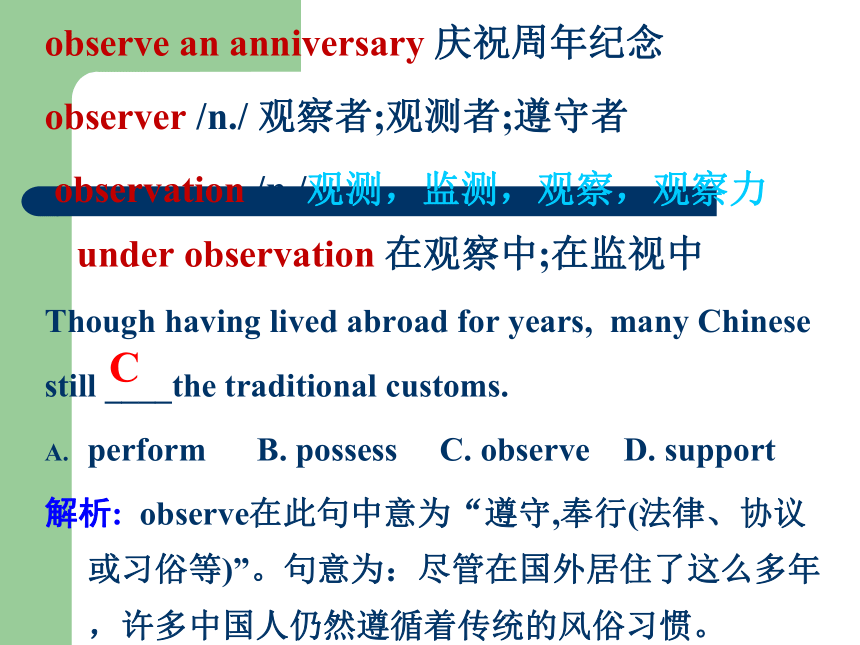
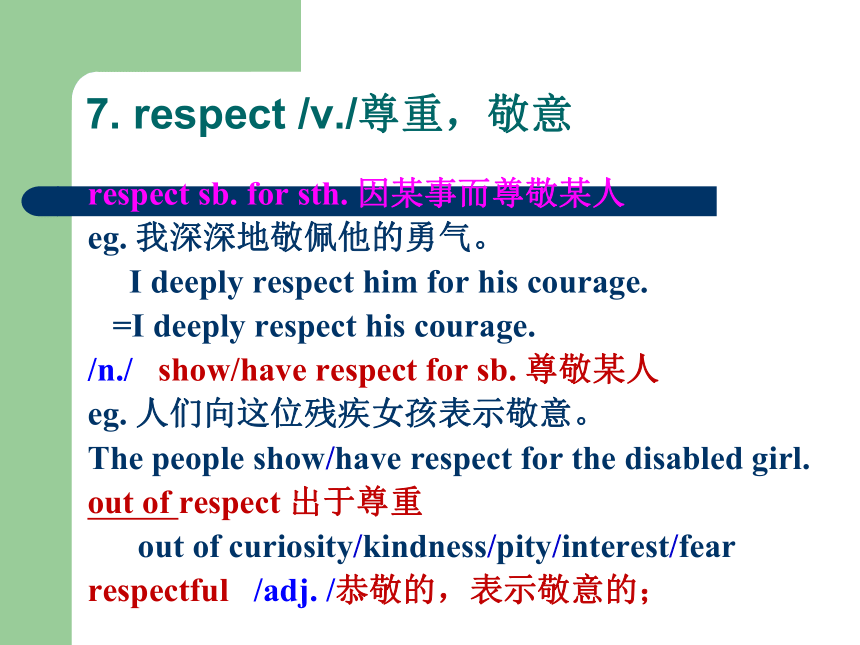
文档简介
Words and Expressions
必修四 Unit 1
1. achievement /n./成就,功绩
a sense of achievement 成就感 [u.]
achieve v. 实现-----achievement n. 成就
realise/achieve one's dream
excite v. 使兴奋-----excitement n. 兴奋
govern v. 管理-----government n. 政府
argue v. 争吵----argument n.争吵,争论
treat v. 对待----treatment n. 对待
2. campaign /n./ 运动;战役; /v./作战
a campaign for 为了……的运动
a campaign against 反对……的运动
eg.
They started a campaign for equal rights.
他们发起了一项争取平等权利的运动。
(2) vi. 参加运动;作战;
campaign for 参加争取……的运动
campaign against 参加反对……的运动
3.condition /n.C/条件;
/n.U/ 状况,状态;
身体健康是获得成功的条件之一。
Heath is one of the most important conditions of achieving success.
be in good/poor/excellent condition 处于好的/差的/极棒的状态中
She is often in top condition.
I’m really out of condition.
4.behave/v./
举动;(举止或行为)表现
eg.I'm sorry about last night--I behaved like a child.
对不起,昨天晚上我表现得太幼稚了。
eg.Behave yourself, young man.
年轻人,规矩些!
(1) behave oneself 守规矩,表现得体;
(2) well-behaved /adj./ 表现好的
badly-behaved /adj./ 表现差的
3.behave/v./举动;(举止或行为)表现
u behaviour /n./ 举止;行为;习性;
eg.The boy was well-behaved at the banquet and everyone praised his proper behaviour.
这个男孩在宴会上表现很好,因此每个人都表扬他恰当的举止.
behave oneself 守规矩
behave well/badly (towards sb.)
(对某人)态度/举止好/恶劣
be on one’s best behavior 举止规矩
4.devote/vt./把….奉献,把…专用于
1)devote oneself /sth. to (doing) sth.
献身于……;致力于……
He devotes himself to finishing the task.
She devotes all her time to her family.
2) devoted (adj.)
深爱的,全心全意的,忠实的
a devoted friend
She is devoted to her family.
她深爱她的家庭。
5.whorthwile /adj./
值得的,值得做的
辨析 worthwhile/worth/worthy
worthwhile (可作定语和表语)
a worthwhile experiment
The experiment is worthwhile.
It is worthwhile to do sth./ doing sth.
It is worthwhile to do the job.
doing the job.
worthwhile /adj./ 值得的,值得做的
*worth --- be worth (doing) sth.
The book is __________________.
well worth reading
= It is worthwhile to read the book.
be worthy of being done.
=be worthy to be done.
The job is worthy of being done.
to be done.
6. observe/vt./观察,观测,遵守
(1) 观察;
observe sb. do sth.
观察某人做某事(全过程)
observe sb. doing sth.
观察某人正在做某事
(2) 遵守;
observe the traffic rules 遵守交通规则
(3) 庆祝;observe the Spring Festival / Christmas
拓展: observation n. 观察,观测;
observe an anniversary 庆祝周年纪念
observer /n./ 观察者;观测者;遵守者
observation /n./观测,监测,观察,观察力 under observation 在观察中;在监视中
Though having lived abroad for years, many Chinese
still ____the traditional customs.
perform B. possess C. observe D. support
解析: observe在此句中意为“遵守,奉行(法律、协议或习俗等)”。句意为:尽管在国外居住了这么多年,许多中国人仍然遵循着传统的风俗习惯。
C
7. respect /v./尊重,敬意
respect sb. for sth. 因某事而尊敬某人
eg. 我深深地敬佩他的勇气。
I deeply respect him for his courage.
=I deeply respect his courage.
/n./ show/have respect for sb. 尊敬某人
eg. 人们向这位残疾女孩表示敬意。
The people show/have respect for the disabled girl.
out of respect 出于尊重
out of curiosity/kindness/pity/interest/fear
respectful /adj. /恭敬的,表示敬意的;
respect /n./方面
with respect to 关于,就……来说
in some respects 在某些方面
in every respect/in all respects 在各方面
out of respect for sb. 出于对某人的尊敬
without respect to不考虑……;不管……
8. argue/v./ 讨论,辩论,争论
argue with sb. about /over sth.和某人争吵某事
We argued with the waiter about the price of the meal.
argue for 为……而辩论
argue against 为反对……而辩论
The workers argued for the right for the strike.
Some people argue against the free trade.
argue that-clause 主张……
辨析argue/quarrel/discuss
argue常用作不及物动词,后面常接介词后才能加宾语。意为“辩论,争论”,有企图说服对方的含义。They argued about the case for hours.
quarrel 意为“争吵,吵架”,侧重以“口角”的方式争执;
discuss 意为“讨论”,为及物动词,后直接加宾
语,指为了解决问题或弄清对方的观点而商量;
9. entertainment/n./款待,娱乐;
娱乐表演
We warmly gave an entertainment to the foreign guests.
entertain/v./ 款待,招待 ;娱乐,助兴
entertaining /adj./ 有趣的,使人愉快的
entertain sb. with sth.
用……招待/款待某人
The child entertained himself with building blocks.
10. inspire/vt./鼓舞,激发,启示
inspire sb. to do sth. 激发某人去做某事
Eg. His spirit inspires us to work hard to
achieve more in our life.
inspiration (n.) 灵感
inspiring (adj.) 鼓励人的
inspired (adj.) 有创作力的
11. support /n.&vt./支持,拥护
support a family 赡养家庭
support oneself 自力更生
support sb.in (doing) sth.
在(做)某事方面支持某人
support sb.by (doing) sth.
通过(做)某事支持某人
in support of sb./sth.支持或支援某人/某事
give support to sb.支持或支援某人
12. audience/n./
观众,听众,读者
① audience是集合名词,用作主语时,其谓语可用单数(视为整体)或复数(视为个体);
② 形容听(观众)人数之多或少,通常用big, large, huge, mass, vast, wide 以及small, thin 等形容词修饰,但不用many, few修饰;
③an audience 不是指“一个观众”,而是指某一群观众、某一个场次观众、某一方面的观众等;
13.intend /vt./计划,打算
intend to do/doing sth.= mean to do sth.
打算做某事
sth.be intended for 某物是为……而准备的
intend sb./sth.to do sth.想要某人/物去做某事
intend that-clause 打算……
had intended to do sth./
intended to have done sth.本来打算做某事
14. emergency/n./
突发事件,紧急情况
It’s an emergency! 情况紧急!
He was always prepared for any unforeseen event of emergency.
他时刻为无法预料的紧急事件做好准备。
a state of emergency 紧急状态
in an emergency 遇紧急情况时
15. considerate/v./考虑;
/adj./考虑周到的
consideration /n./考虑
in consideration of...考虑到……,顾及……
take...into consideration考虑到……;体谅……
be under consideration在考虑中,在审议中
give consideration to sth./give sth.
consider /v./考虑;认为
consider doing sth.考虑某事
be considered to be/as...
被认为……;被看作……
16. deliver/vt./递送,生(小孩)
发表(演说等)
deliver a baby 助产,接生
deliver sth. to sb. 把某物递送给某人
delivery /n./传送
He is delivering a speech in English.
Would you please deliver my message to your mother?
1.human being 人
一个人 a human being
人类 human beings
eg. This is an invention that benefits human beings
eg. We should make greater contributions to human beings.
拓展:man/ mankind 人类
(其前都不加冠词,都是u.其后谓语v.用单三)
2.move off 离开,启程,出发
When we got to the station, the train
had moved off.
move on 继续前进/进行
move out 迁出;搬出
move in 迁进;搬进
move away 搬走
3. lead a…..life 过着…..的生活
lead to 通向;导致
lead in 导入;引进
I feel like leading a simple life.
This road leads to our school.
4. crowd in (想法、问题等)涌上心头
crowd in (on sb.) / crowd into one’s mind
(想法、问题等)涌上心头,涌入脑海
crowd out (常用被动)挤出;排挤在外
crowd around/round(sb./sth.)
聚集在(某人/某物周围)
crowd into 涌入,挤进…….
a crowd of 一群,众多
be crowded with 挤满……
5. look down upon/on 蔑视,瞧不起
反义:look up to sb.尊敬某人
No one likes to be looked down upon.
look round/ about 四处查看,寻找
look after 照顾,照看(人或事物)
look ahead 向前看
look forward to 期待,盼望
look into 调查,检查
look out 向外看;注意,小心
look through
检查,审视;快速查看,浏览
look up 查找,查阅;向上看
look on 旁观
look on... as... 把……看作/视为...
look back 回顾
6.refer to 查阅,参考,谈到
refer to ...as ... 把……称作……
refer ...to...把……提交给……(以求获得帮助)
(2)reference /n./言及;提及;参考;查阅
in/with reference to 关于
without reference to 与……无关;不管
7. by chance 碰巧,凑巧
by accident 碰巧
on purpose 故意地,有意地
by design 故意
By chance he found the very book he was alwa
8. come across (偶然)遇见;碰见
How come? 为什么?怎么会?怎么搞的?
come about 发生
come along 一起来;一道走
come down to 下垂到;达到;流传下来
come on 得啦;快点
come out 出来;出版;开花
come to 达到;总计为;结果是
come to oneself
(昏迷后)苏醒过来;恢复理性
come up 上来;(从土中)长出,发芽
come up with 提出;想出
come true 实现
9. carry on 继续,坚持
carry on with/doing sth. 继续做某事
carry off 赢得;获得(奖品、荣誉等)
carry out
实行;执行;进行;履行(诺言、义务等)
carry through
帮……渡过(难关等);维持;完成
2)The meal over, the managers went back to the meeting room to ____ their discussion.
A. put away B. take down
C. look over D. carry on
解析 put away收好,放好, take down写下,记下;
look over从……上面看;查看,检查;
carry on继续。
句意:吃完饭,经理们回到会议室继续讨论。
D.
Ⅲ. 句型透视
1.Only after her mother came to help her for the first few months was she allowed to begin her project.她母亲头几个月来帮她的忙,这才使她得以开始自己的计划。
此句是only引导的一个倒装句。当only修饰副词 、介词短语或状语从句,且放在句首时,主句必须用部分倒装结构。
(1)否定副词(词组)never,nor, hardly, little,
seldom, by no means等置于句首时,句子要用部分倒装结构。
Ⅲ. 句型透视
Never before have I seen such a moving film.
我从来没有看过这样感人的电影。
By no means will we give in to them.
我们决不会向他们让步。
(2)so 或 neither/nor表示前者的情况也适用于另一人或物时,其句型为“so/neither/nor + be/助动词/情态动词+另一主语”。so指肯定情况,意为“……也是如此”,neither/nor适用于前者是否定的情况,意为“……也不这样”。
Ⅲ. 句型透视
Lily can’t ride, neither/nor can Lucy.
莉莉不会骑车,露西也不会。
注意 如果句意不是“……也是如此”,而仅是对前面内容的肯定或附和(此时的so=indeed),那么句子不可使用倒装语序。
—You forgot to take your key with you again!
—你又忘记带钥匙了!
—Oh, my god. So I did!
噢,我的天哪,我确实忘了带!
Ⅲ. 句型透视
3)so+ adj./adv.+that...引导的结果状语从句结构中, so+adj./adv.置于句首时,句子须用部分倒装。
So clearly does he speak English that he can always make himself understood.
他英语讲得如此清晰,以致于别人总能理解他意思。
注意 that引导的句子不倒装。
Ⅲ. 句型透视
(4)在非真实条件句中可省略if,把were, had, should 提到句首构成部分倒装结构。
Should it rain tomorrow, we would not go
climbing.若明天下雨,我们就不去爬山了。
Ⅲ. 句型透视
2.Once I stop, it all comes crowding in and I remember the chimps in laboratories.
我一旦停下来,所有的一切都会涌上心头,我就会想起实验室里的黑猩猩。
[解读] once引导条件状语从句,意为“一旦”;crowding in为现在分词短语作伴随状语。
Ⅲ. 句型透视
3. Suddenly it hit me how difficult it was for a woman to get medical training at that time.我突然想起在那个年代,一个女子去学医是多么难。
[解读] “It hits/hit /strike sb.+从句”表示
“某人突然想起”。
拓展:Sth. occurs to sb.
It occurs to sb. that….. 某人想到了…..
Ⅲ. 句型透视
4. Watching a family of chimps wake up is our first activity of the day.我们当天的首项任务就是观察黑猩猩一家是如何醒来的。watching a family of chimps
wake up是动名词短语,在句中作主语。动名词作主语往往表示一种概念、习惯或经验。
Ⅲ. 句型透视
5. I did not know the answer until one evening when I sat down at the computer to do some research on great women of China.直到一天晚上当我坐在电脑旁搜索中国伟大女性的时候我才知道答案。
[解读] not ... until ... “直到……才……”。
[仿写] 直到三年前从教育战线退休以后,他才考虑到国外度假。
He __________________________________
he retired from teaching three years ago.
didn't consider having a holiday abroad until
必修四 Unit 1
1. achievement /n./成就,功绩
a sense of achievement 成就感 [u.]
achieve v. 实现-----achievement n. 成就
realise/achieve one's dream
excite v. 使兴奋-----excitement n. 兴奋
govern v. 管理-----government n. 政府
argue v. 争吵----argument n.争吵,争论
treat v. 对待----treatment n. 对待
2. campaign /n./ 运动;战役; /v./作战
a campaign for 为了……的运动
a campaign against 反对……的运动
eg.
They started a campaign for equal rights.
他们发起了一项争取平等权利的运动。
(2) vi. 参加运动;作战;
campaign for 参加争取……的运动
campaign against 参加反对……的运动
3.condition /n.C/条件;
/n.U/ 状况,状态;
身体健康是获得成功的条件之一。
Heath is one of the most important conditions of achieving success.
be in good/poor/excellent condition 处于好的/差的/极棒的状态中
She is often in top condition.
I’m really out of condition.
4.behave/v./
举动;(举止或行为)表现
eg.I'm sorry about last night--I behaved like a child.
对不起,昨天晚上我表现得太幼稚了。
eg.Behave yourself, young man.
年轻人,规矩些!
(1) behave oneself 守规矩,表现得体;
(2) well-behaved /adj./ 表现好的
badly-behaved /adj./ 表现差的
3.behave/v./举动;(举止或行为)表现
u behaviour /n./ 举止;行为;习性;
eg.The boy was well-behaved at the banquet and everyone praised his proper behaviour.
这个男孩在宴会上表现很好,因此每个人都表扬他恰当的举止.
behave oneself 守规矩
behave well/badly (towards sb.)
(对某人)态度/举止好/恶劣
be on one’s best behavior 举止规矩
4.devote/vt./把….奉献,把…专用于
1)devote oneself /sth. to (doing) sth.
献身于……;致力于……
He devotes himself to finishing the task.
She devotes all her time to her family.
2) devoted (adj.)
深爱的,全心全意的,忠实的
a devoted friend
She is devoted to her family.
她深爱她的家庭。
5.whorthwile /adj./
值得的,值得做的
辨析 worthwhile/worth/worthy
worthwhile (可作定语和表语)
a worthwhile experiment
The experiment is worthwhile.
It is worthwhile to do sth./ doing sth.
It is worthwhile to do the job.
doing the job.
worthwhile /adj./ 值得的,值得做的
*worth --- be worth (doing) sth.
The book is __________________.
well worth reading
= It is worthwhile to read the book.
be worthy of being done.
=be worthy to be done.
The job is worthy of being done.
to be done.
6. observe/vt./观察,观测,遵守
(1) 观察;
observe sb. do sth.
观察某人做某事(全过程)
observe sb. doing sth.
观察某人正在做某事
(2) 遵守;
observe the traffic rules 遵守交通规则
(3) 庆祝;observe the Spring Festival / Christmas
拓展: observation n. 观察,观测;
observe an anniversary 庆祝周年纪念
observer /n./ 观察者;观测者;遵守者
observation /n./观测,监测,观察,观察力 under observation 在观察中;在监视中
Though having lived abroad for years, many Chinese
still ____the traditional customs.
perform B. possess C. observe D. support
解析: observe在此句中意为“遵守,奉行(法律、协议或习俗等)”。句意为:尽管在国外居住了这么多年,许多中国人仍然遵循着传统的风俗习惯。
C
7. respect /v./尊重,敬意
respect sb. for sth. 因某事而尊敬某人
eg. 我深深地敬佩他的勇气。
I deeply respect him for his courage.
=I deeply respect his courage.
/n./ show/have respect for sb. 尊敬某人
eg. 人们向这位残疾女孩表示敬意。
The people show/have respect for the disabled girl.
out of respect 出于尊重
out of curiosity/kindness/pity/interest/fear
respectful /adj. /恭敬的,表示敬意的;
respect /n./方面
with respect to 关于,就……来说
in some respects 在某些方面
in every respect/in all respects 在各方面
out of respect for sb. 出于对某人的尊敬
without respect to不考虑……;不管……
8. argue/v./ 讨论,辩论,争论
argue with sb. about /over sth.和某人争吵某事
We argued with the waiter about the price of the meal.
argue for 为……而辩论
argue against 为反对……而辩论
The workers argued for the right for the strike.
Some people argue against the free trade.
argue that-clause 主张……
辨析argue/quarrel/discuss
argue常用作不及物动词,后面常接介词后才能加宾语。意为“辩论,争论”,有企图说服对方的含义。They argued about the case for hours.
quarrel 意为“争吵,吵架”,侧重以“口角”的方式争执;
discuss 意为“讨论”,为及物动词,后直接加宾
语,指为了解决问题或弄清对方的观点而商量;
9. entertainment/n./款待,娱乐;
娱乐表演
We warmly gave an entertainment to the foreign guests.
entertain/v./ 款待,招待 ;娱乐,助兴
entertaining /adj./ 有趣的,使人愉快的
entertain sb. with sth.
用……招待/款待某人
The child entertained himself with building blocks.
10. inspire/vt./鼓舞,激发,启示
inspire sb. to do sth. 激发某人去做某事
Eg. His spirit inspires us to work hard to
achieve more in our life.
inspiration (n.) 灵感
inspiring (adj.) 鼓励人的
inspired (adj.) 有创作力的
11. support /n.&vt./支持,拥护
support a family 赡养家庭
support oneself 自力更生
support sb.in (doing) sth.
在(做)某事方面支持某人
support sb.by (doing) sth.
通过(做)某事支持某人
in support of sb./sth.支持或支援某人/某事
give support to sb.支持或支援某人
12. audience/n./
观众,听众,读者
① audience是集合名词,用作主语时,其谓语可用单数(视为整体)或复数(视为个体);
② 形容听(观众)人数之多或少,通常用big, large, huge, mass, vast, wide 以及small, thin 等形容词修饰,但不用many, few修饰;
③an audience 不是指“一个观众”,而是指某一群观众、某一个场次观众、某一方面的观众等;
13.intend /vt./计划,打算
intend to do/doing sth.= mean to do sth.
打算做某事
sth.be intended for 某物是为……而准备的
intend sb./sth.to do sth.想要某人/物去做某事
intend that-clause 打算……
had intended to do sth./
intended to have done sth.本来打算做某事
14. emergency/n./
突发事件,紧急情况
It’s an emergency! 情况紧急!
He was always prepared for any unforeseen event of emergency.
他时刻为无法预料的紧急事件做好准备。
a state of emergency 紧急状态
in an emergency 遇紧急情况时
15. considerate/v./考虑;
/adj./考虑周到的
consideration /n./考虑
in consideration of...考虑到……,顾及……
take...into consideration考虑到……;体谅……
be under consideration在考虑中,在审议中
give consideration to sth./give sth.
consider /v./考虑;认为
consider doing sth.考虑某事
be considered to be/as...
被认为……;被看作……
16. deliver/vt./递送,生(小孩)
发表(演说等)
deliver a baby 助产,接生
deliver sth. to sb. 把某物递送给某人
delivery /n./传送
He is delivering a speech in English.
Would you please deliver my message to your mother?
1.human being 人
一个人 a human being
人类 human beings
eg. This is an invention that benefits human beings
eg. We should make greater contributions to human beings.
拓展:man/ mankind 人类
(其前都不加冠词,都是u.其后谓语v.用单三)
2.move off 离开,启程,出发
When we got to the station, the train
had moved off.
move on 继续前进/进行
move out 迁出;搬出
move in 迁进;搬进
move away 搬走
3. lead a…..life 过着…..的生活
lead to 通向;导致
lead in 导入;引进
I feel like leading a simple life.
This road leads to our school.
4. crowd in (想法、问题等)涌上心头
crowd in (on sb.) / crowd into one’s mind
(想法、问题等)涌上心头,涌入脑海
crowd out (常用被动)挤出;排挤在外
crowd around/round(sb./sth.)
聚集在(某人/某物周围)
crowd into 涌入,挤进…….
a crowd of 一群,众多
be crowded with 挤满……
5. look down upon/on 蔑视,瞧不起
反义:look up to sb.尊敬某人
No one likes to be looked down upon.
look round/ about 四处查看,寻找
look after 照顾,照看(人或事物)
look ahead 向前看
look forward to 期待,盼望
look into 调查,检查
look out 向外看;注意,小心
look through
检查,审视;快速查看,浏览
look up 查找,查阅;向上看
look on 旁观
look on... as... 把……看作/视为...
look back 回顾
6.refer to 查阅,参考,谈到
refer to ...as ... 把……称作……
refer ...to...把……提交给……(以求获得帮助)
(2)reference /n./言及;提及;参考;查阅
in/with reference to 关于
without reference to 与……无关;不管
7. by chance 碰巧,凑巧
by accident 碰巧
on purpose 故意地,有意地
by design 故意
By chance he found the very book he was alwa
8. come across (偶然)遇见;碰见
How come? 为什么?怎么会?怎么搞的?
come about 发生
come along 一起来;一道走
come down to 下垂到;达到;流传下来
come on 得啦;快点
come out 出来;出版;开花
come to 达到;总计为;结果是
come to oneself
(昏迷后)苏醒过来;恢复理性
come up 上来;(从土中)长出,发芽
come up with 提出;想出
come true 实现
9. carry on 继续,坚持
carry on with/doing sth. 继续做某事
carry off 赢得;获得(奖品、荣誉等)
carry out
实行;执行;进行;履行(诺言、义务等)
carry through
帮……渡过(难关等);维持;完成
2)The meal over, the managers went back to the meeting room to ____ their discussion.
A. put away B. take down
C. look over D. carry on
解析 put away收好,放好, take down写下,记下;
look over从……上面看;查看,检查;
carry on继续。
句意:吃完饭,经理们回到会议室继续讨论。
D.
Ⅲ. 句型透视
1.Only after her mother came to help her for the first few months was she allowed to begin her project.她母亲头几个月来帮她的忙,这才使她得以开始自己的计划。
此句是only引导的一个倒装句。当only修饰副词 、介词短语或状语从句,且放在句首时,主句必须用部分倒装结构。
(1)否定副词(词组)never,nor, hardly, little,
seldom, by no means等置于句首时,句子要用部分倒装结构。
Ⅲ. 句型透视
Never before have I seen such a moving film.
我从来没有看过这样感人的电影。
By no means will we give in to them.
我们决不会向他们让步。
(2)so 或 neither/nor表示前者的情况也适用于另一人或物时,其句型为“so/neither/nor + be/助动词/情态动词+另一主语”。so指肯定情况,意为“……也是如此”,neither/nor适用于前者是否定的情况,意为“……也不这样”。
Ⅲ. 句型透视
Lily can’t ride, neither/nor can Lucy.
莉莉不会骑车,露西也不会。
注意 如果句意不是“……也是如此”,而仅是对前面内容的肯定或附和(此时的so=indeed),那么句子不可使用倒装语序。
—You forgot to take your key with you again!
—你又忘记带钥匙了!
—Oh, my god. So I did!
噢,我的天哪,我确实忘了带!
Ⅲ. 句型透视
3)so+ adj./adv.+that...引导的结果状语从句结构中, so+adj./adv.置于句首时,句子须用部分倒装。
So clearly does he speak English that he can always make himself understood.
他英语讲得如此清晰,以致于别人总能理解他意思。
注意 that引导的句子不倒装。
Ⅲ. 句型透视
(4)在非真实条件句中可省略if,把were, had, should 提到句首构成部分倒装结构。
Should it rain tomorrow, we would not go
climbing.若明天下雨,我们就不去爬山了。
Ⅲ. 句型透视
2.Once I stop, it all comes crowding in and I remember the chimps in laboratories.
我一旦停下来,所有的一切都会涌上心头,我就会想起实验室里的黑猩猩。
[解读] once引导条件状语从句,意为“一旦”;crowding in为现在分词短语作伴随状语。
Ⅲ. 句型透视
3. Suddenly it hit me how difficult it was for a woman to get medical training at that time.我突然想起在那个年代,一个女子去学医是多么难。
[解读] “It hits/hit /strike sb.+从句”表示
“某人突然想起”。
拓展:Sth. occurs to sb.
It occurs to sb. that….. 某人想到了…..
Ⅲ. 句型透视
4. Watching a family of chimps wake up is our first activity of the day.我们当天的首项任务就是观察黑猩猩一家是如何醒来的。watching a family of chimps
wake up是动名词短语,在句中作主语。动名词作主语往往表示一种概念、习惯或经验。
Ⅲ. 句型透视
5. I did not know the answer until one evening when I sat down at the computer to do some research on great women of China.直到一天晚上当我坐在电脑旁搜索中国伟大女性的时候我才知道答案。
[解读] not ... until ... “直到……才……”。
[仿写] 直到三年前从教育战线退休以后,他才考虑到国外度假。
He __________________________________
he retired from teaching three years ago.
didn't consider having a holiday abroad until
同课章节目录
